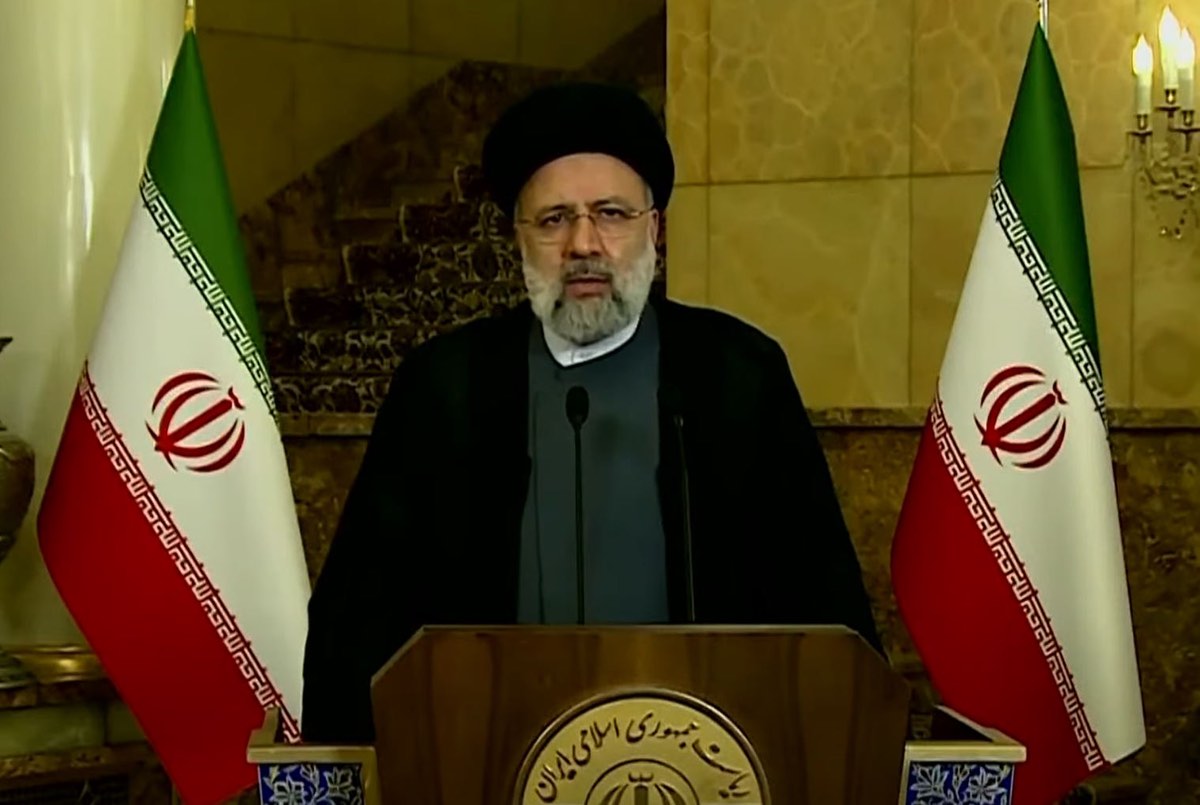(JNS) The brouhaha surrounding Iranian President Ebrahim Raisi’s comments about the Nazi genocide of the Jews, during an interview that aired on Sunday with CBS News’s “60 Minutes,” is puzzling.
Anyone who expected the radical political figurehead of the mullah-ruled Islamic Republic to acknowledge, let alone denounce, the acts of the Third Reich—when his regime makes no bones about wanting to finish the job that Adolf Hitler started—is living in an alternate universe.
Nevertheless, the short exchange he had on the topic with correspondent Lesley Stahl made international headlines and was circulated widely on social media. When asked by Stahl whether he “believe[d] the Holocaust happened—that 6 million Jews were slaughtered,” Raisi replied, “Look, historical events should be investigated by researchers and historians. There are some signs that it happened. If so, they should allow it to be investigated and researched.”
The only thing noteworthy about this was his willingness to point to “some signs that it happened.” It was almost amusing of him to suggest that it be “investigated and researched.”
As though he had no idea that it’s been studied for decades and verified by historians and survivors. And as if his role-model ayatollahs aren’t keen to emulate the Holocaust, albeit Islamist-style: first, through terrorist proxies in Syria, Lebanon, Judea and Samaria and Gaza, and ultimately with nukes.
“So, you’re not sure; I’m getting that you’re not sure,” Stahl said quietly, being careful to avoid causing her interviewee to rue over having agreed to be challenged by a woman.
“What about Israel’s right to exist?” she then queried.
Here, Raisi didn’t hesitate or moderate his answer. But he did, however, refrain from repeating the name of the Jewish state that’s in the crosshairs of his massive arsenal of weapons, both in Iran and along Israel’s borders.
“You see, the people of Palestine are the reality,” he said. “This is the right of the people of Palestine who were forced to leave their houses and motherland. The Americans are supporting this false regime there to take root and to be established there.”
Stahl failed to remind Raisi that the ancient homeland of the Jewish people became a state in 1948, 13 years before he was born. Instead, she invoked the Abraham Accords.
“You know that Morocco, Bahrain, Sudan and the United Arab Emirates have all recognized Israel and have relations with Israel. And it is said that Saudi Arabia is also talking directly with Israel,” she said. “I wonder if you want to comment on that.”
As it happens, Raisi did. “If a state shakes hands with the Zionist regime [Israel], then they are also an accomplice to their crimes,” he stated matter-of-factly. “And they are stabbing the very idea of Palestine in the back.”
Figuring that she had belabored the issue, as well as that of the yet again stalled nuclear negotiations, Stahl immediately turned to the former Islamic Revolutionary Guard Corps’ Quds Force commander Maj. Gen. Qassem Soleimani, who was killed on Jan. 3, 2020, in a U.S. airstrike in Iraq.
“Are you intending to retaliate by assassinating officials from the Trump administration?” Stahl asked.
Calling the targeting of Soleimani a “heinous crime,” Raisi replied, “We want justice to be served. We are not going to forget about this.”
When she pressed him on what he meant—whether he was referring to an “eye for an eye,” for example—Raisi reverted to fake denial mode.
“[Those are] the type of the actions that the Americans and Zionist regimes are doing in the world,” he said. “We are not going to carry out the same actions.”
Most of Stahl’s criticisms, if you can call them that, were reserved for narration in between the Q+A segments. This included mention of American hostages, the arrest of dissidents and the case of 22-year-old Mahsa Amini, who was beaten to death on Friday by Iranian “morality police” for not having her head properly covered.
Speaking of which, Stahl was decked out for the interview—which was recorded last Tuesday at the presidential compound in Tehran—sporting a hijab of her own. In fairness to the celebrity journalist, she wouldn’t have been granted the tête-à-tête had she not adhered to a set of pre-interview rules.
As she explained to the audience, she had been instructed what to wear, how to address Raisi and when to sit down after his arrival. But she overdid her graciousness in a Western kind of way that didn’t fly.
“Hi, I’m Leslie,” she said sweetly when he entered the room. To her embarrassment, he was visibly unimpressed. Clearly, she isn’t used to being given the cold shoulder, certainly not by a man about to bask in her coveted gaze and broadcast opportunity.
In other words, in the absence of both feminine and feminist wiles, Stahl was out of her element. Raisi, on the other hand, was uber-comfortable in his.
This hit home as the crew began to pack up its equipment. Stahl described the unpleasant scene as follows: “As we ended what seemed to be a cordial conversation, we were surprised when a member of Raisi’s staff reached up and blocked one of our cameramen from shooting our goodbyes. Another one of our cameramen’s phone was confiscated and held by President Raisi’s security team for two and a half hours.”
It’s a perfect metaphor for the utter disconnect between the U.S.-led P5+1 countries and the terrorist regime that they keep trying to engage in meaningless and dangerous diplomacy.
That Stahl and her team were “surprised” by the thuggish behavior of their hosts—all because of the “cordial conversation” that preceded the it—is as ridiculous as the media’s response to Raisi’s Holocaust remarks.

